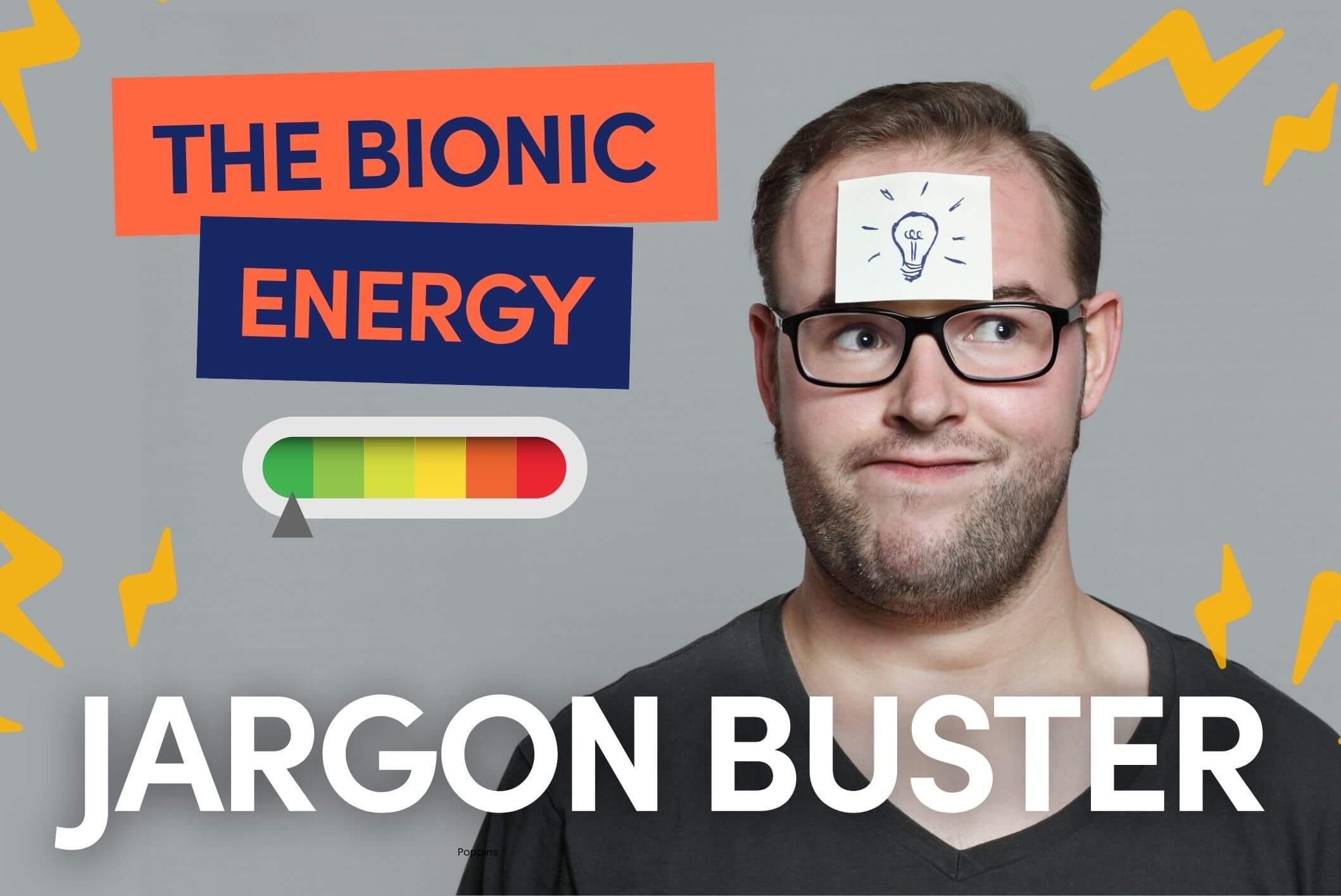The Bionic energy jargon buster guide: everything you need to know
Energy bills can be confusing enough without all the technical jargon that comes with them. Whether you’re a business owner who’s just starting out or you’ve been running things for years, there are likely some terms and phrases you come across that leave you scratching your head.
Understanding business energy jargon doesn’t just help you navigate your bills - it empowers you to make smarter decisions, save money, and stay on top of the latest trends in the energy market. Let’s dive in.
Why does understanding business energy jargon matter?
As a business owner, you’ll probably face energy-related decisions regularly. From choosing a supplier to understanding your bills, the language used in the energy industry can sometimes be baffling.
Without a clear understanding, you could be left feeling confused, which could lead to higher energy costs, missed opportunities, or even mistakes in managing your energy.

Business energy jargon explained A-Z
A
Annual consumption
This refers to the total amount of energy your business uses over the course of a year. It’s typically measured in kilowatt-hours (kWh) for electricity and gas, although the gas meter itself will display these in either cubic meters (m3) or cubic feet (ft3). Knowing this helps you get a better idea of how much energy you’re using and how much your bills should be.
Availability charge
This is a fixed charge applied by some suppliers, covering the cost of being able to supply energy to your business, regardless of whether you use it or not. It’s like a standing charge for access to the energy network.
Average consumption
This is the average amount of energy a business uses over a set period. It helps suppliers assess your energy needs, especially when you’re signing up for a new contract.
Find out more about the average business energy consumption with our guide.
Automatic meter reading (AMR)
This system allows your energy meter to send readings automatically to your supplier, removing the need for manual meter readings. This is helpful for accurate bills and preventing estimated charges.
B
Base load
The minimum level of energy consumption that your business needs, even during low-usage times. It’s the steady amount of power required to run essential equipment and keep operations moving.
Bill
Your energy bill outlines how much you’ve been charged for your energy use. It can include your consumption rate, standing charges, VAT, and any additional fees, like late payment charges.
Bill validation
The process of reviewing and checking your energy bills to ensure you’ve been charged correctly, based on your actual usage. It’s essential to catch any errors early.
Blend and extend contract
A blend and extend contract is a flexible option where you combine an existing contract with new terms to create a deal that works better for your business. This may involve adjusting prices or terms for the duration of the contract.
Broker
An energy broker acts as an intermediary between your business and energy suppliers, helping you find the best deal. Brokers can save you time and help you get a great deal.
Boiler
A key piece of equipment in heating systems, boilers convert fuel (like gas or oil) into heat for your building. Regular servicing is crucial to make sure your boiler is in top condition and avoid any unnecessary callouts.
C
Carbon footprint
This refers to the total amount of greenhouse gases your business produces, measured in CO2-equivalent. It includes emissions from energy usage, transport, and other business activities.
Find out more about reducing your carbon footprint.
Capacity charge
A charge that relates to the maximum capacity of energy your business can draw from the supply network. This is usually calculated based on your peak demand and can affect your energy costs.
Climate Change Levy (CCL)
The Climate Change Levy (CCL) is a tax that businesses in the UK have to pay on their energy use, aimed at encouraging more energy-efficient practices and reducing carbon emissions.
Change of tenancy
When a new tenant moves into a property, the energy supply has to change hands. The new tenant must make sure the meter is read and updated to avoid any confusion about who is responsible for the energy bills.
Commercial energy
Commercial energy is energy that’s used by businesses rather than domestic households. It includes electricity, gas, and other fuels needed to run a business.
Consumption
The total amount of energy used by your business during a specific period. It’s usually measured in kWh for electricity and cubic meters or feet for gas.
Contract end date
The date when your current energy contract expires. Make sure to keep an eye on this to avoid being rolled over to a standard variable rate, which could be more expensive.
Corporate Power Purchase Agreement (PPA)
A Corporate Power Purchase Agreement (PPA) is a long-term contract between a business and a renewable energy supplier. It helps companies lock in energy prices and support the transition to renewable energy.
Cooling-off period
A short period (usually 14 days) after signing an energy contract, during which you can cancel the deal without a penalty.
D
Day rate
This refers to the electricity or gas unit prices charged by suppliers during peak hours, usually between 4 p.m. and 7 p.m.
Decentralised energy
Decentralised energy is power generated close to where it’ll be used, rather than coming from a large power plant. This generation is done on a smaller scale and usually includes renewable energy systems.
Deemed contract
A deemed contract will usually be put in place when a customer moves into a new property and hasn’t formally agreed on a contract with the current energy supplier.
Distribution Network Operator (DNO)
Distribution Network Operators (DNOs) are companies licensed to manage and maintain the electricity infrastructure in your local area. They make sure it reaches your business safely, using a network of underground cables, overhead power lines, transformers and more.
Direct Debit
Direct Debit is a simple, automated way to pay for your business energy bills. Once a Direct Debit is set up on your account, the total will be automatically taken out of your bank on the agreed date.
Domestic energy
Energy used in homes, as opposed to commercial energy used by businesses. Business energy tariffs also differ from domestic ones in terms of pricing and structure.
Dual fuel
A billing arrangement where both your gas and electricity are supplied by the same company. This can make managing your energy bills easier and sometimes cheaper.
E
Estimated annual consumption
An estimate of how much energy your business is likely to consume over the course of a year, typically calculated based on your historical or average usage for businesses of the same size and industry.
Energy audit
An energy audit is a thorough review of your business’s energy usage, designed to identify areas where you could save energy and reduce your costs. It’s a great way to optimise your energy efficiency.
Energy contract
The agreement between your business and an energy supplier detailing terms like pricing, duration. It’s crucial to compare quotes to find a competitive deal for your business before taking out an energy contract.
Energy consultant
An energy consultant is a professional who helps businesses understand their energy needs. They can also assist in improving your energy efficiency and sustainability practices.
Energy management software
Software tools are designed to help businesses monitor and manage their energy usage. Energy management software can also provide insights, track consumption, and suggest cost-saving measures to help your business.
Energy market
The system through which energy suppliers buy and sell electricity and gas. Prices fluctuate based on supply and demand, and businesses should keep an eye on market trends to secure the best deal.
Energy supplier
An energy supplier is the company that provides the energy your business uses. Suppliers set the terms in your contract and the price you’ll pay for energy.
Energy storage systems
Energy storage systems are technologies that store energy for later use, like batteries. These solutions can help businesses manage energy demand and save on costs.
Energy Performance Certificate (EPC)
An Energy Performance Certificate (EPC) rates the energy efficiency of your business premises. The higher the rating, the more energy-efficient your building is, which could help reduce the cost of your energy bills.
Energy procurement
This is the process of sourcing and purchasing energy for your business. Energy procurement could involve anything from negotiating with suppliers to using brokers to secure the best deal.
Energy tariff
The pricing plan offered by an energy supplier. Tariffs can vary based on factors like time-of-use (day or night rates) or the type of energy you use (like green energy).
Energy theft
Energy theft is the illegal act of using gas and electricity without paying for it. This can be done by tampering with meters or bypassing connections.
Evening rate
The rate at which you’re charged for electricity in the evening, often during off-peak hours. Evening rates can be lower than day rates and are a good option if your business has flexible operating hours.
F
Fixed rate contract
A contract where the price of energy is locked in for a set period, offering predictable energy costs for your business. This is great for peace of mind, especially when prices are fluctuating.
Flex approach tariffs
A type of tariff where you can take advantage of favourable wholesale rates by buying your energy for the months or years ahead, usually when costs are low.
Forecasting
The process of predicting future energy usage based on historical data. Accurate forecasting can help businesses avoid over or underpaying for energy and plan for their future needs.
G
Gas meter
The device that measures the amount of gas used by your business. Regular checks can help with accurate bills and help spot any issues with your gas supply.
Gas register
A record of all gas meters, used by suppliers to identify the specific meter serving your business. This is usually linked to your MPRN (more on that later!). Find out more about how to stay gas safe with our guide.
Green energy
Energy that comes from renewable sources like solar, wind, or hydroelectric power. Using green energy can reduce your carbon footprint and help your business become more sustainable.
Grid
The network of power lines and equipment that delivers electricity from power plants to businesses and homes across the country. The grid is managed by different operators in different parts of the country to ensure a steady supply of energy.
H
Half-hourly meter
A type of meter used for businesses that consume large amounts of energy. These half-hourly meters record energy usage — like it says — every half hour, giving suppliers a detailed view of your consumption patterns.
I
Import capacity
The maximum amount of energy that can be supplied to your business at any given time. This is key for ensuring that your business doesn’t exceed the limits set by your energy supplier.
Industry regulator
An organisation that oversees the energy industry to ensure fairness, compliance with the law, and protection for consumers. In the UK, the main regulator is Ofgem.
Interconnector
A connection between energy networks in different regions or countries. Interconnectors allow energy to be imported or exported, helping to balance supply and demand.
J
Joules
A unit of energy used to measure the energy consumed or produced. Joules are more commonly used in scientific contexts, while businesses will generally see kWh on their energy bills.
K
Kilowatt (kW)
A unit of power equal to 1,000 watts. This is used to measure the rate at which energy is consumed or produced.
Kilowatt-Hour (kWh)
A unit of energy used to measure consumption. If an appliance uses 1 kW of power for one hour, it consumes 1 kWh of energy. You’ll typically see that your energy bills are measured in kWh.
L
Letter of Authority (LOA)
A Letter of Authority is a document that gives an energy broker or consultant permission to act on your behalf when negotiating energy contracts with suppliers.
Load management
The process of balancing the supply and demand for energy. Businesses can use load management techniques so they aren’t using more energy than necessary, which can help reduce costs.
Losses (network losses)
The energy that is lost during transmission from power stations to end-users. These losses can account for a small percentage of the energy you pay for, but are typically factored into the costs.
M
Meter Point Administration Number (MPAN)
The unique reference number that identifies your electricity supply point. Your MPAN is used by energy suppliers to manage your account and make sure your bills are accurate.
Meter Point Reference Number (MPRN)
The equivalent of the MPAN, but for gas. The MPRN uniquely identifies your gas supply point and helps suppliers with billing and supply management.
Meter readings
The recorded data from your energy meter is used to determine how much energy your business has consumed. It’s essential to submit accurate readings to avoid getting estimated bills through the post.
Meter charges
Fees charged by your energy supplier for maintaining and reading your meter. Metering charges are typically included in your energy bill and are a fixed cost.
Meter Serial Number (MS)
The unique identifier for your energy meter. This number is used for monitoring and maintenance purposes by your energy supplier.
Multi-site meter
A multi-site meter is a meter that can measure energy consumption across multiple business locations. This is great for businesses with different branches or offices, helping to streamline your energy management.
N
Network charges
Network charges are fees paid to the company that operates the energy network (like a DNO) for transporting electricity or gas to your business. These charges are typically included in your energy bill.
Net Zero
The state in which the amount of greenhouse gases emitted by your business is balanced by the amount removed by the atmosphere. Many businesses are working towards achieving net zero – outlined by the British government to be net zero by 2050 — by using renewable energy and offsetting their emissions.
Non-commodity costs
Non-commodity costs are the part of your energy bill that covers the costs of running the energy system, such as transmission, distribution, and any government charges. These costs are separate from the cost of the actual energy you consume.
Non-domestic energy
This is another term for commercial energy. It’s energy that’s used in commercial properties as opposed to domestic (household) energy.
O
Ofgem
The Office of Gas and Electricity Markets, Ofgem, is the regulator for the electricity and gas markets in the UK. It ensures that suppliers operate fairly, customers are protected, and energy prices are kept under control.
Out-of-Contract rates
The higher rates you may be charged if your energy contract expires and you haven’t yet signed a new one. These rates are usually higher than those found in fixed or flexible contracts, so it’s important to renew your agreement before your contract ends.
P
Peak demand
The highest level of energy consumption your business uses during a specific period, usually during the day. Suppliers may charge for energy used during peak demand times, so understanding this can help you manage your energy costs.
Price cap
A price cap is a limit set by the regulator, Ofgem, on the maximum price that suppliers can charge for energy to protect consumers from excessively high energy prices.
Power Purchase Agreement (PPA)
A Power Purchase Agreement (PPA) is a long-term contract between a business and an energy supplier, typically for purchasing renewable energy directly from the producer. It can help businesses lock in energy prices and support green energy generation.
R
Renewable energy
Energy that comes from natural sources that are replenished, like wind, solar, hydroelectric, and geothermal. Businesses may choose to use renewable energy to help reduce their environmental impact.
Renewable energy certificates
Certificates issues to businesses that use renewable energy. These renewable energy certificates confirm the source of the energy and may be able to track renewable usage or meet sustainability goals.
Rollover contract
A rollover contract is a type of contract that automatically renews when it reaches the end of its terms unless the business opts out. These contracts often have less favourable terms, so it’s best to shop around and find the right deal before your contract expires.
S
Settlement
This is the process of finalising payments between energy suppliers and distributors. This means that all energy transitions are completed correctly, and the right fees have been paid.
Smart meter
A digital meter that records your energy usage in real time and automatically sends this information to your supplier. Smart meters help with accurate bills and allow businesses to monitor their energy consumption more easily.
Standing charge
A standing charge is a fixed daily or monthly charge added to your energy bill to cover the costs of maintaining your connection to the grid.
Supplier
The company that provides your energy. Suppliers set the price, manage your account, and handle all the billing. It’s important to compare suppliers so you know you’re getting the best deal for your business.
Supply capacity
The maximum amount of energy that can be supplied to your business, based on the contract you have with your energy supplier.
Switch date
The date on which your business switches from one energy supplier to another. It’s important you know the switch date to avoid overlapping contracts or paying exit fees.
T
Time-of-use tariff
A time-of-use tariff is where the price of energy varies depending on the time of day. This can be great for businesses that can shift their energy usage to off-peak times when energy is cheaper.
U
Unit rate
The rate at which you’re charged for the energy you use, typically measured in pence per kilowatt-hour (p/kWh). Your unit rate will depend on your supplier, tariff, and contract type.
V
VAT
VAT stands for value added tax. This is applied to the sale of goods and services, including energy. The VAT rate on business energy is typically 20%, though some businesses may qualify for a reduced rate.
Variable rate contract
This is a type of energy contract where the price can fluctuate based on market conditions. While these contracts are flexible, they can result in higher energy costs if the prices rise.
Voltage optimisation
Voltage optimisation is a technology that reduces the amount of energy used by regulating the voltage supplied to your equipment. This can help improve the efficiency of your electrical systems and reduce your energy bills.
W
Wholesale energy prices
These are prices energy suppliers pay when purchasing energy from the market. These prices can fluctuate based on demand and supply, and ultimately affect what businesses pay for their energy.
Get up to date with energy prices with Bionic
The world of business energy can be tricky to navigate, but with this jargon buster, you’re now better equipped to understand the key terms and make informed decisions.
Remember, energy costs can have a big impact on your bottom line, so it pays to shop around. Get in touch with the team at Bionic to switch your business energy, gas, and electricity. Or, head over to our guides page to find out everything there is to know about energy and more.








